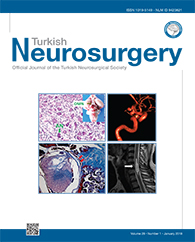2Interventional Institute of Zhengzhou University, Zhengzhou, China DOI : 10.5137/1019-5149.JTN.18186-16.1 AIM: Clinical treatment of multiple intracranial aneurysms remains challenging due its higher rate of rupture compared to a single aneurysm. We aimed to assess the efficacy of one-stage endovascular embolization for treatment of multiple intracranial aneurysms.
MATERIAL and METHODS: We treated 72 aneurysms from 33 patients with one-stage endovascular embolization from September 2010 to October 2015. Of these, 60 aneurysms were treated with coils, while 12 wide-neck aneurysms were embolized with the assistance of intracranial stents. Follow-up studies ranged from 3 to 28 months, and patient outcomes were assessed using the modified Rankin Scale (mRS) and digital subtraction angiography (DSA).
RESULTS: All aneurysms were embolized successfully and no complications occurred. DSA immediately after procedure revealed that complete occlusion was achieved in 39 cases, neck remnant was observed in 27 cases, and a residual aneurysm remnant was observed in six cases. All patients achieved excellent clinical outcomes following embolization (27 patients with a mRS score of 0 and 6 with a mRS score of 1). Six months after the procedure, DSA was performed on 28 patients, revealing one case with a neck remnant, and two cases with completely occluded aneurysms. Despite these outcomes, there was no rupture or hemorrhage of these aneurysms throughout the six months.
CONCLUSION: One-stage endovascular embolization is a safe and effective treatment for multiple intracranial aneurysms, but long-term outcomes should be further evaluated.
Keywords : Multiple intracranial aneurysms, Embolization, Endovascular, Stent, Coiling




